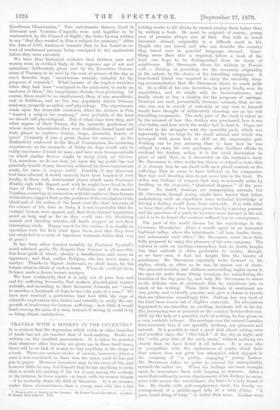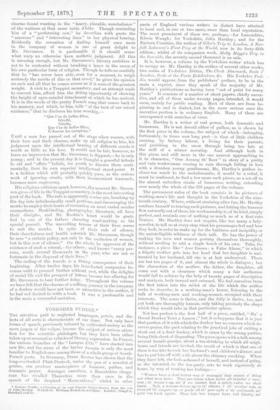- TRAVELS WITH A DONKEY IN THE CEVENNES.* IT iS
evident that the depression which exists in other branches of trade has not yet reached that of book-making. Books are written on the smallest provocation. It is taken for granted that whatever other luxuries are given up, in these hard times, there will be no lack of money to buy anything in the shape of .a book. There are certain circles of society, moreover, where a man is not considered to have won his spurs until he has put -pen to paper. However immature may be his views of life, and however little he may feel himself that he has anything to write that is worth the reading, if his lot is cast among the amthetic or the intense, he loses repute—at least, with his women friends —if he modestly shuns the field of literature. It is no wonder, under these circumstances, that a young man who has a few • nymels ,wilh a Donkey in the Cevennet. By Robort Louie SLovenson. Lyndon : C. Sepal Paul and Co. 1870. holiday-weeks to fill thinks he cannot employ them better than by writing a book. He must be original, of course ; young men of promise always aim at that. But with so much literature abroad, originality is a difficult mark to hit. People who can travel, and who can describe the country they travel over in graceful language, abound. Some- thing more than this is required, before a book of the kind can hope to be distinguished from its hosts of neighbours. Mr. Stevenson shows his wisdom in Travels with a Donkey, in providing for the necessary originality in the outset, by the choice of his travelling companion. A four-footed friend was required to carry the unwieldy sleep- ing accommodation that Mr. Stevenson shows so much pride in. As a child of his own invention, he purrs loudly over its capabilities, and we might add, its inconveniences ; and finally elects to buy a donkey, for the purposes of carriage. Donkeys are such proverbially tiresome animals, that no one who was not in search of notoriety at any cost to himself would have thought of deliberately choosing one as his sole travelling companion. The early part of the book is taken up by the account of how this donkey was purchased, how it was over-laden, and how much the writer had to beat it. Pages are devoted to his struggles with the 'unwieldy pack, which was apparently far too large for the small animal, and which was arranged with great lack of skill on the impromptu pad. Nothing can be less amusing than to hear how he was obliged to carry his own packages, after fruitless efforts to overload his donkey, unless it is the vivid description he gives of each blow, as it descended on the creature's back. Mr. Stevenson in other works has shown so refined a taste, that it is strange how he can dwell with such placid content on the sufferings that he owns to have inflicted on his companion. Raw legs and bleeding skin do not move him in the least. He stifles any feelings of remorse that may occasionally arise, by dwelling on the exquisite, " Quakerish elegance" of the poor brute. No doubt, donkeys are exasperating animals, but Mr. Stevenson, though young, might have known that before undertaking such an expedition some technical knowledge of driving a donkey would have been advisable, It is with relief we hear that, after a few lessons given him by a passing peasant and the purchase of a goad, he becomes more learned in the art, and it is to be hoped the creature suffered less in consequence.
The part of the world chosen for his wanderings is the Cevennes Mountains. After a month spent in an animated highland valley, where the inhabitants "all hate, loathe, decry, and calumniate each other," Mr. Stevenson must have been fully prepared to enjoy the pleasure of his own company. The sojourn in such an exciting atmosphere had, no doubt, taught him that solitude is often preferable to society, though, as we have seen, it had not taught him the beauty of gentleness. Mr. Stevenson especially looks forward to his nights, which, as often as he can, he passes out of doors.• The unusual serenity and stillness surrounding nights spent in the open air make them fitting occasions for assimilating the beauties of the day gone by, and help Mr. Stevenson to weave in the delicate vein of sentiment that he introduces into so much of his writing. These little threads of sentiment are very pretty and evidently genuine, and give a charm to travels that are otherwise exceedingly thin. Seldom has any book of the kind been woven out of slighter materials. No adventures happened to our traveller, no exciting incidents fell to his lot. His journeying was as peaceful as the country he travelled over. Still, by the help of a graceful style of writing, he has given us a very readable volume. His musings over the natural beauties that surround him, if not specially striking, are pleasant and natural. It is possible to read a good deal about setting suns and jewelled stars, the " blue-black " of the sky at night, and the "mild, gray blue of the early morn," without realising too clearly that we have heard it all before. It is easy also to sympathise with the enthusiasm of youth, which finds that nature does not grow less attractive when enjoyed in the company of "a pretty, engaging " young hostess. Mr. Stevenson takes no pains to conceal his susceptibility towards the softer sox. When his feelings are most wrought upon, he remembers them with longing or remorse. After a more than ordinarily severe chastisement of his donkey, he recog- nises with sorrow the resemblance she bears to a lady friend of his. He dwells with self-complacency upon his kindly en- couragement of a middle-aged lady at a table d'hôte. "A poor, timid thing of forty." is better than none. Neither were charms found wanting in the "heavy, placable, nonchalance" of the waitress at that same table d'hôte. Though reminding him of a "performing cow," he describes with gusto the 4' amorous" and "interesting lines" in her physical bearing. Evidently the sensation of finding himself once more in the company of women is one of great delight to Mr. Stevenson. It is pardonable if it should some- what warp an otherwise keen Eesthetic judgment. All this is amusing enough, but Mr. Stevenson's literary ambition is not to be contented without breaking a lance in the cause of !his own particular form of religion. Though he tells us candidly that he "has never been able, even for a moment, to weigh seriously the merits of this or that creed," he gives his opinion on each and all that he comes across as if it were of the greatest weight. A visit to a Trappist monastery, and an attempt made to convert him, afford him the fitting opportunity of showing the height of open-minded detachment at which he has arrived. It is in the words of the pretty French song that conies back to his memory, and which, to him, tells "of the best of our mixed existence," that he discloses his true worship,— " Que t'as de belles fillos,
GirelbS, Girotla„ Quo t'as de belles filles, L'Amour los comptera."
Until a man has passed out of the stage when women, with their love and their charms, make up all religion to him, his judgment upon the intellectual bearing of different creeds is worth as little as his love. It would not be fair, however, to leave an impression that Mr. Stevenson is flippant,—he is only young ; and in the present day it is thought a graceful tribute to old and "effete " beliefs, for youth to discuss them senti- mentally, from its own superior intellectual stand-point. It
• is a fashion which will probably quickly pass, as the serious work of ignoring creeds, with their inconvenient trammels, becomes more engrossing.
His religious criticism apart, however, the account Mr. Steven- son gives of life in the Trappist monastery, is the most interesting part of the book. The rule is apparently a wise one, breaking up the day into infinitesimally small portions, and neouraging the monks to employ their hours of recreation on most varied secular occupations. Bookbinding, photography, literature, all have their disciples, and Mr. Ruskin's heart would be grati- fied by one of the fathers choosing road-making as his special pursuit. The unexciting tenour of their lives seems to suit the monks. In spite of their rule of silence, their cheerfulness and health astonish Mr. Stevenson, though he sees "a certain policy, not only in the exclusion of women, but in this vow of silence." On the whole, he approves of the existence of such a retreat,—for others ; and knows "many per. eons, worth several thousands in the year, who are not so fortunate in the disposal of their lives."
The ending of the travels is a fitting consequence of their beginning. After twelve days, his four-footed companion be- comes unfit to proceed further without rest, while the delights of social life and the prospect of letters become too alluring for Mr. Stevenson to bear further delay. Throughout the volume we have felt that the charms of a solitary journey in the company of a donkey would have not been so attractive to the author, if he had not desired to write a book. It was a pardonable and in the main a successful ambition.



































 Previous page
Previous page